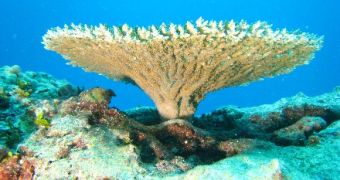Latest scientific discoveries point to the fact that coral reefs and sand are "allergic" to each other, in that they can't survive together. This is especially true for the coral reefs, which, once sand gets in their midst, die and cannot regenerate even after long periods of time. The find is essential in understanding how exactly global warming and climate change will affect the existence and development of already threatened banks of reefs worldwide.
CoECRS member and James Cook University professor David Bellwood says that the most crushing blow a dieing coral reef could receive is to be covered by sand and algae. The corals would be smothered and sand would then settle on the rocks reefs use for support. With the rocks now useless for corals, they would find themselves floating around, with nothing to hang on to. In some cases, researchers noticed that the sand tied to the rocks so tightly that reef regeneration was impossible. The current study was conducted so ecologists could form an idea about how exactly global temperature changes and rising sea water could influence the coral reefs.
Another disturbing discovery that the recent study made was that algae-eating fish tend to move away from seaweeds that have sediments or sand on them, much like humans wouldn't eat something that has sand in it. These fish are essential to the coral reefs, as they help keep the area around them clean of weeds, thus allowing the reef to grow and expand. But if sediments continue to accumulate, due to pollution, grazing, farming and other human activities, it's very likely that herbivorous fish would move away from the reef or risk disappearing.
The only thing that humans can do to prevent extensive reef populations from dieing is to reduce their harmful activities around reefs to a minimum. Also, algae-eating fish must be preserved and encouraged to grow, if reefs are to stand the least of chances in surviving the rise of waters. "We can (...) reduce our own impact on the process by checking the flow of erosion off the land onto coral reefs, and by ensuring that populations of weed-eating fish are maintained at levels high enough to control the weeds," says David Bellwood, professor at the Australian National University, who also participated in this study.

 14 DAY TRIAL //
14 DAY TRIAL //